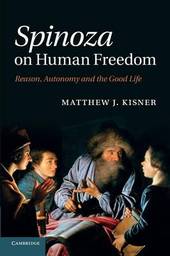
|
Spinoza on Human Freedom: Reason, Autonomy and the Good Life
Paperback / softback
Main Details
| Title |
Spinoza on Human Freedom: Reason, Autonomy and the Good Life
|
| Authors and Contributors |
By (author) Matthew J. Kisner
|
| Physical Properties |
| Format:Paperback / softback | | Pages:274 | | Dimensions(mm): Height 229,Width 152 |
|
| ISBN/Barcode |
9781107669260
|
| Classifications | Dewey:199.492 |
|---|
| Audience | | Professional & Vocational | |
|---|
| Illustrations |
Worked examples or Exercises
|
|
Publishing Details |
| Publisher |
Cambridge University Press
|
| Imprint |
Cambridge University Press
|
| Publication Date |
5 December 2013 |
| Publication Country |
United Kingdom
|
Description
Spinoza was one of the most influential figures of the Enlightenment, but his often obscure metaphysics makes it difficult to understand the ultimate message of his philosophy. Although he regarded freedom as the fundamental goal of his ethics and politics, his theory of freedom has not received sustained, comprehensive treatment. Spinoza holds that we attain freedom by governing ourselves according to practical principles, which express many of our deepest moral commitments. Matthew J. Kisner focuses on this theory and presents an alternative picture of the ethical project driving Spinoza's philosophical system. His study of the neglected practical philosophy provides an accessible and concrete picture of what it means to live as Spinoza's ethics envisioned.
Author Biography
Matthew J. Kisner is Associate Professor at the University of South Carolina. He has previously published articles on a variety of topics in early modern philosophy, including Descartes, Hobbes, Spinoza and Malebranche.
Reviews'... this is an admirable reframing of Spinoza's ethical project. Kisner is correct to assign a central role to human passivity in Spinoza and doing so leads him to some very interesting ethical conclusions ... Given that the majority of the literature before now has presented Spinoza's philosophy as overly austere and almost inhuman ... Kisner's interpretation is a much needed corrective, one that has much to offer in its own right.' Eugene Marshall, Mind
|